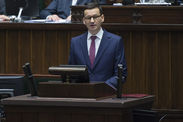-

FOR Communication 31/2018: Misunderstandings about the upgrade of Poland’s rating by Standard & Poor's | 2018-10-29
moreThe upgraded rating of Poland by Standard & Poor's led to many different interpretations, some of them erroneous or exaggerated. Many observers perceived it as an improvement in the assessment of Poland's long-term economic prospects, while in fact it is only a reversal of the cut from January 2016, the beginning of the Law and Justice government. Poland’s rating was already on the current level earlier, in 2007-2015, even though these were the years of the global financial crisis and the solvency crisis in the euro area.
-

Communication 28/2018: The budget for 2019: new taxes | 2018-10-04
moreThe fast economic growth, in place since 2014 due to the good economic situation in the global economy, leads to an increased state's income. Combined with the limited growth rate of some expenditures, it gives the government more room for maneuver.
-

Analysis 10/2018: Employee Capital Plans are not a substitution for longer retirement age | 2018-09-10
moreEmployee Capital Plans (Pracownicze Programy Kapitałowe, PPK), similarly to Open Pension Funds (Otwarte Fundusze Emerytalne, OFE), are to invest premiums paid in by participants on the capital market.
-

FOR Message 23/2018: Budget 2019: unprepared for an economic downturn | 2018-08-31
moreThe crucial factor for the safety of public finances is the deficit of the entire public finance sector. The state budget is responsible for less than half of the expenditure. In addition, the public finance sector includes budgets of local governments, the Social Insurance Institution, the Agricultural Social Insurance Institution, the National Health Fund and a number of other entities.
-

Aleksander Łaszek, Rafał Trzeciakowski: Just 5.6 Million People Produce Half of Polish GDP, 4Liberty | 2018-08-28
moreThe ongoing discussion in Poland regarding the high variation in wages and income inequality focuses on the way in which added value generated in the economy is distributed between employees (wages), employers (profits) and the government (taxes).
-

Aleksander Łaszek: Poland: The Bill for Government Services in 2017, 4Liberty | 2018-05-16
moreOn April 27, 2018, Civil Development Forum (FOR) presented The Bill for Government Services in 2017, which shows the structure of Poland’s government expenditures. Like every year, the current seventh edition of the campaign took place just before the tax filing deadline.
-

Aleksander Łaszek, Rafał Trzeciakowski: Polish PM Morawiecki’s Declarations Versus Reality, 4Liberty.eu | 2018-02-12
moreIn his first parliamentary speech as a prime minister Mateusz Morawiecki (PMM) repeated many theses of the government officials which have been repeated for the last two years. Some of them are wrong and contradict the experiences of other countries. Others, while right, stand in clear contradiction with the actual actions of the Polish government.
-

Analysis 15/2017: Morawiecki’s exposé: declarations and reality | 2017-12-29
moreIn his exposé, Prime Minister Mateusz Morawiecki (PMM) repeated many theses proclaimed for the last two years; some of them are wrong and contradict the experiences of other countries; others, while right, stands in clear contradiction with the actual actions of the government.
-

FOR Communication 24/2017 : Lifting of the limit on pension contribution: further tightening of the tax screws and a blow to innovation | 2017-11-28
moreGovernment declares a good state of public finances but at the same time intensifies its search for new ways to drain the taxpayers’ pockets. The newest example is provided by the work currently in progress on lifting the upper limit on pension contributions. As a result, for earnings starting at about 6 thousand PLN net monthly, each additional zloty paid by the employer will be burdened with 52 groszes of taxes and premiums, and only 48 groszes will go to the employee.
-

FOR Communication 22/2017: The slogans of PiS: facts and myths | 2017-11-17
moreTwo years of the PiS’ (the Law and Justice party) government constituted an unprecedented attack on Polish institutions of the rule of law. In the economic sphere, the government acts in a way that increases what should fall - public debt, and decreases what should grow - the strength of the private sector. It places Poland on a dangerous turn of her history, and the economic prospects of our country start to look bleak, especially in the event of a downturn in the global economy.
